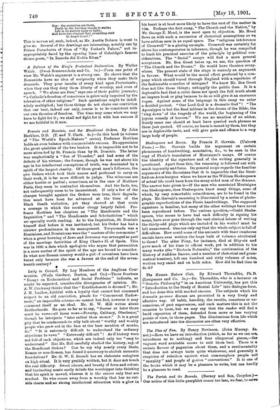Shakespeare not Bacon. By Francis P. Gervais. (Unicorn Press.) —
Mr. Gervais builds his argument on certain phenomena of handwriting, annotation, &c., to be seen in the copy of Florio's translation of Montaigne's essays. Of course the identity of the signature and of the writing generally is questioned. Apart from this, the reasoning is followed out with much ingenuity and force. Its general scope regards the familiar arguments of the Baconians that .it is impossible that the Strat- ford-on-Avon burgess whom we know as the William Shakespeare of actual life could have been the many-sided man of the dramas. The answer here given is—If the man who annotated Montaigne was Shakespeare, then Shakespeare knew many things, some of which, by very remarkable coincidences, are to be found in the plays. Mr. Gervais's reasoning is illustrated by a series of photo- graphic reproductions of the Florio handwritings. The supposed signature is familiar, but many of the other writings have never been reproduced before. The curious question,—Could Shake- speare, who seems to have had such difficulty in signing his name, have ever gone through the vast clerical labour of writing the thirty-odd plays which are included in his works? must be left unanswered. One can only say that the whole subject is full of difficulties. How could some of the ancients with their cumbrous uncials have ever written the huge bulk of volumes attributed to them ? The elder Pliny, for instance, died at fifty-six and gave much of his time to official work, yet in addition to his many works (the "Ilistozia Naturalis," the continuation of the History of Anfidias Bassus, and a number of rhetorical and gram- matical treaties), left one hundred and sixty volumes of notes, written very small and on both sides. How did he find time to do it?






































 Previous page
Previous page